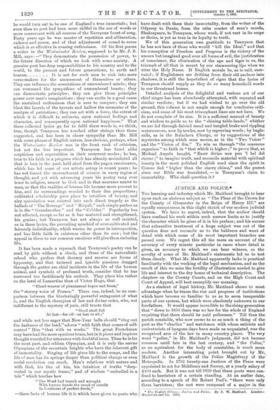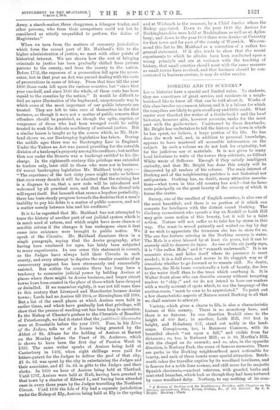JUSTICE AND POLICE.* THE learning and industry which Mr. Maitland
brought to bear upon such an abstruse subject as "The Pleas of the Crown for the County of Gloucester in the Reign of Henry III." are equally conspicuous in this slight sketch of our modern judicial system. We have to regret, indeed, that the author should have confined his work within such narrow limits as to justify the character which he gives of it in his preface ; and his excuse that exhaustive treatment of a huge subject was out of the question does not reconcile us to the baldness and want of detail with which some of its most important branches are passed over. We regret this all the more on account of the accuracy of every minute particular in cases where detail is given, an accuracy to which we can bear witness, as the novelty of some of Mr. Maitland's statements led us to test them closely. What Mr. Maitland apparently lacks is practical familiarity with the working of the legal mechanism, and as the result of this we miss the fertility of illustration needed to give life and interest to the dry bones of technical description. The chapters on the County Courts, and on the High Court and Court of Appeal, will best exemplify our meaning.
As a student of legal history, Mr. Maitland shows to most advantage when he traces the rise and progress of institutions which have become so familiar to us as to seem inseparable parts of our system, but which were absolutely unknown to our forefathers. It would appear incredible to the rising generation that "down to 1856 there was no law for the whole of England requiring that there should be paid policemen." Till then the parish constable, who now seems to us as much a thing of the past as the " charlies " and watchmen with whom satirists and caricaturists of byegone days have made us acquainted, was the recognised arm of the law in many country places. The very word "police," in Mr. Maitland's judgment, did not become common until late in the last century, and "the Police," as an equivalent for the body of conttables, is much more modern. Another interesting point brought out by Mr. Maitland is the growth of the Police Magistracy of the Metropolis. In 1792 twenty-one Justices of the Peace were appointed to act for Middlesex and Surrey, at a yearly salary of £400 each. But it was not till 1839 that these posts were con- fined to barristers of a certain standing. At an earlier date, according to a speech of Sir Robert Peel's, "there were only three barristers ; the rest were composed of a major in the The English Citizen: Aura and Police. By F. W. Maitland. London : Macmitlan and Co. 1885.
Army, a starch-maker, three clergymen, a Glasgow trader, and other persons, who from their occupations could not but be considered as utterly unqualified to perform the duties of Magistrates."
When we turn from the matters of summary jurisdiction which form the second part of Mr. Maitland's title to the higher administration of justice, we meet with other points of historical interest. We are shown how the cost of bringing criminals to justice has been gradually shifted from private persons to the county, and from the county to the nation. Before 1752, the expenses of a prosecution fell upon the prose- cutor, but in that year an Act was passed dealing with the costs of prosecutions in cases of felony. From that time till the year 1836 those costs fell upon the various counties, but "since that year one-half, and since 1846 the whole, of these costs has been repaid to the counties by the nation." It would be difficult to find an apter illustration of the haphazard, unsystematic way in which some of the most important of our public interests are treated. They are left to take care of themselves in the first instance, as though it were not a matter of public concern that offenders should be punished, as though the spite, caprice, or vengeance of those who had been wronged could be safely trusted to work the delicate machinery of national justice. But a similar lesson is taught us by the course which, as Mr. Mait- land shows us, our Bankruptcy legislation has taken. During the middle ages there was no Bankruptcy Law in England. Under the Tudors an Act was passed providing for the rateable division of a bankrupt's property among his creditors; but neither then nor under the Stuarts was a bankrupt entitled to his dis- charge. In the eighteenth century this privilege was extended to traders only, later still to those who were not in business. Of recent bankruptcy legislation Mr. Maitland truly says :— " The experience of the last sixty years might make us believe that once every decade it will be admitted that the existing law is a disgrace to us, that a new code will be introduced and welcomed by all practical men, and that then the dismal tale will repeat itself. But beneath what seems a hopeless periodicity, there has been steady progress towards the doctrine that a man's inability to pay his debts is a matter of public concern, and not a matter merely between him and his creditors."
It is to be regretted that Mr. Maitland has not attempted to trace the history of another part of our judicial system which is in much need of reform, and which might have more chance of sensible reform if the changes it has undergone since it first came into existence were brought to public notice. We speak of the Circuits. Mr. Maitland dismisses them in a single paragraph, saying that the Assize geography, after having been unaltered for ages, has lately been subjected to many experiments. In one sense this statement is correct, as the Judges have always held their Circuits in each county, and every attempt to deprive the smaller counties of an unnecessary pageant has been strenuously and successfully resisted. But within the counties there has long been a tendency to economise judicial power by holding Assizes at places where there might be Assize business, and larger circuit towns have been created in the place of those which have decayed or dwindled. If we remember rightly, it was not till some time in this century that Liverpool and Manchester became Assize towns ; Leeds had no Assizes till 1864, or Birmingham till 1884. But a list of the small places at which Assizes were held in earlier times, and which have gradually lost that privilege, will show that the process of weeding-out has been long in operation. In the Bishop of Chester's preface to the Chronicle of Benedict of Peterborough, we find it stated that the justitiarii itinerantes were at Dunstable before the year 1163. Foss, in his Lives of the judges, tells us of a licence being granted by the Abbot of St. Albans for the holding of Assizes at Barnet on the Monday before the Feast of St. Ambrose, which is shown to have been the first day of Passion Week in 1333. The same writer speaks of Assizes being held at Canterbury in 1402, when eight shillings were paid for letters-patent for the Judges to deliver the gaol of that city, £1 6s. 8d. was spent by the city in entertaining the Judges and their associates, and 21 3s. 4d. in gifts to the Judges and their clerks. In 1630 we hear of Assizes being held at Thetford. Until 1797, Assizes were held at Hull, having been granted to that town by a charter of Edward I., and having been attended once in every three years by the Judges travelling the Northern Circuit. Until 1836 the Isle of Ely had a separate jurisdiction under the Bishop of Ely, Assizes being held at Ely in the spring and at Wisbeach in the summer, by a Chief Justice whom the Bishop appointed. Down to the year 189 the Assizes for Buckinghamshire were held at Buckingham as well as at Ayles- bury; and down to the year 1851 there were Assizes at Coventry for that town and for part of the county of Warwick. We com- mend this list to Mr. Maitland as a correction of a rather too general statement. If it also tends to show that the recent experiments to which he alludes have been conducted upon a wrong principle and are at variance with the teaching of history, that small counties should meet with the same measure as small towns have received, and that business should be con- centrated in business centres, it may do wider service.















































 Previous page
Previous page